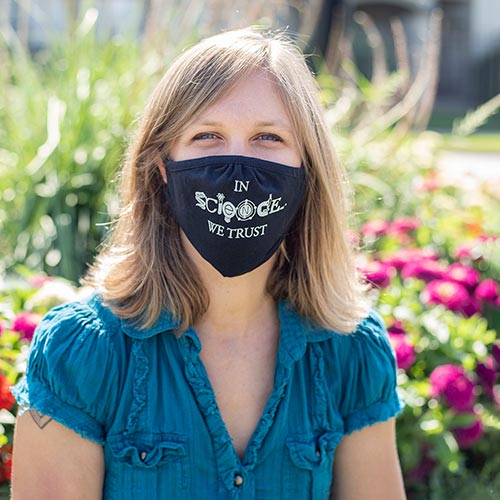by Laurie Laker '12
"This current generation, and I include Colorado College students in that, is doing the most on climate change," explains Ulyana Horodyskyj, visiting professor in CC's Environmental Studies Program, and professor for Summer Session's Block A class Introduction to Global Climate Change.
"They've done nothing to inherit this crisis, but they're doing everything when it comes to addressing it."
That crisis is global climate change, cause by historical, contemporary, and future human and climate interactions. The class serves as an introduction to the contemporary Earth climate system, one that is in constant flux and change via human and non-human elements. Focusing on the roles of atmosphere, ocean, and land, the class examines how the system has changed in the past and how it may yet change in the future. While the science of changing climate is a large component of the class, there is also a heavy focus on the roles that policy, economics, and ethics play in highlighting and mitigating human impact.
"Environmental issues are so prevalent right now, especially at CC and in our community," says Emily McKinley '22, an Economics major and Spanish minor.
"While I knew basics of climate change, I wanted to know more about how I could make positive change, which policies were helpful, and where the science and evidence stands on the issue."
The class, taught online, tackled the whole picture of climate change - not simply the science, but the fully human elements that play prominent roles in the ongoing crisis. Communicating those via online methods, rather than in-person through field trips and data gathering opportunities, presented challenges and rewards in equal measure. The COVID-19 pandemic itself demonstrated cause for hope in tackling climate change.
"The silver lining of COVID is that it shows us just how quickly we can move when we have to," explains Horodyskyj.
"COVID poses an immediate threat, so the world rallied. Throughout history, climate change has been distanced and removed from our focus. That's changing now that the impact is starting to really be felt, so there's that emerging parallel with COVID in terms of how climate change can be combated and addressed."
Horodyskyj initially had some concerns about how she would maintain her usual class structures of teaching in an online-only environment.
"Initially, I worried that there was a real missing component for the students, not being able to take physical field trips, so I hope that I was able to supplement that with the virtual and video elements I brought to the class," says Horodyskyj.
From what her students say, they seem to have more than supplemented.
Colleen Campbell '23, a Race, Ethnicity and Migration Studies and Education double major who is also pursuing a Feminist and Gender Studies minor, recalls the class being very deliberate in how it was constructed, managed, and how conversations and learning opportunities were facilitated.
"Ulyana was incredibly intentional about how class was constructed," she says. "We had virtual field trips and loads of video work, including a trip to the National Science Foundation Ice Core Facility in Lakewood."
Part of the online Zoom and Slack-based classroom experiences included a component called Science Stories each Friday, where Horodyskyj discussed her own research and field work with the class. Her work focuses on a range of topics, from climate shifts, dust and soot deposition on snow and ice, to glacial lake growth and melting.
"Those discussions and examples from her own life, they really grounded climate change more for us as a real, actionable thing, something we can all get involved with. They brought global concepts into a more localized, personal focus," says Campbell.
Shaping that focus, how we move forward to fully and effectively combat climate change, is tough but mandatory work. Doing this in the full context of racial and social justice, tackling the human elements of a systemic and scientific issue, that's the key component to true global change with worldwide population buy in.
"What we're going through now, COVID and the Black Lives Matter movement- it's taught me that I can have an impact, can use my resources to get information out there, especially at local levels of change," says McKinley.
"This whole experience for my generation, while in some respects unfortunate and disheartening, it also allows a generation to find its activist voice, to make change happen."
The holistic element of tackling climate change is vital for how we take the next steps. Without everyone's voice being considered, heard, and seen in the process of change, we're at risk of continuing the systemic racism that exists in this and numerous other areas of concern.
"There's a real confluence between environmental racism and social justice," says Campbell.
"Drawing connections across multiple fields, looking at everything with a social science and critical thinking lens, allows us to be more thorough about not just the hard science, but the human element of that science as well."
"For instance, there's the concept of "black carbon" which is soot, and the burning of biomass like wood and coal. We learned that it's mostly women of color around the world who're most negatively impacted by climate change - they're burning this biomass for cooking, and the patriarchal structures that exist worldwide put more women of color in positions of cook and homemaker than anyone else."
The goal here, explains Horodyskyj, is to arm this generation of students not just with scientific data, but with human impact stories as well. That combination is what matters when communicating the dangers of climate change and stressing the changes we must take to address them.
"It's about providing knowledge, and being able to speak effectively about climate science," she says. "Of course, there are technical elements and skills involved in that, but despite the seeming separation between science and human impact, there are points of both that we can engage on and affect real change. Now more than ever."






